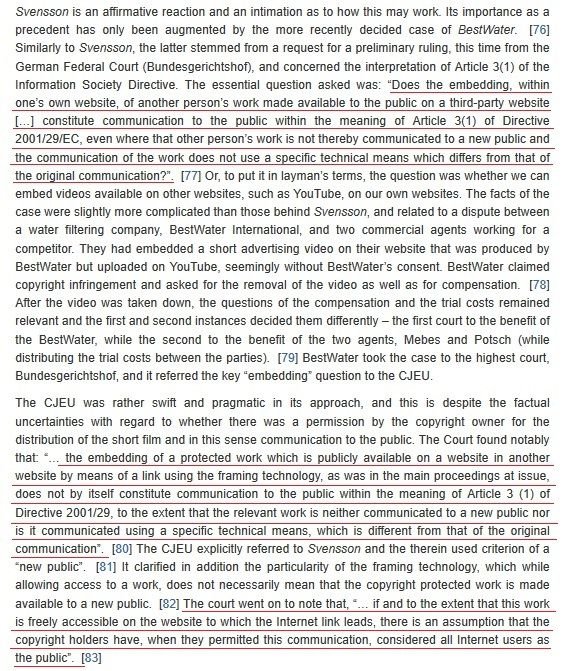Here is a more lengthy article relating to this case and to another case that followed after this one relating to the same issue.
https://www.jipitec.eu/issues/jipitec-5-3-2014/4098
I'll add two relevant passages.

You are ok, as long as you link the content to the original site on which it was first published by it's author.
Here's the actual wording from the Court's decision which can be read in full here: http://curia.europa.eu/juris/document/document.jsf?docid=147847&mode=req&pageIndex=1&dir=&occ=first&part=1&text=&doclang=EN&cid=128073
29 Such a finding cannot be called in question were the referring court to find, although this is not clear from the documents before the Court, that when Internet users click on the link at issue, the work appears in such a way as to give the impression that it is appearing on the site on which that link is found, whereas in fact that work comes from another site.
The other case relating to this issue for which the same ruling was given.

Yes, it is okay, as long as you make sure to cite your source (aka, the link you have to add). The site you first quoted said this:
Which is very misleading, because they aren't saying you have to share your source.
Copy/pasting an entire article and simply posting a link to it at the bottom is very poor manner, but apparently not illegal perse. However, pretending it is your own work is quite bad.
Actually, I always think this is easier to understand when talking about photographs, artwork or (music)videos. I think if you would post a music video of Taylor Swift on your site, pretended it was you and actually earned quite a bit of money off of it, you'd surely get sued and that wouldn't be something you'd win. So if it's not okay to do that with such a video, it's also not okay to do that with a digital art piece someone shared online. Just because it's online, doesn't mean you can grab it and use it without giving due credit.
The author didn't have to repeat that you have to mention the link to the original website because that's already been said twice in the Court's decision which is quoted in the article. See points 25 and 27.
I've made a post compiling our short convo on this and also gave an example.
That's true. That's illegal and if you do that you're committing fraud if I'm not mistaken. The article didn't imply that though.
As long as you mention the source, you can grab any text, photograph, video, audio, artwork and copy/paste on your website, and even earn money from it. This especially applies to Steemit.
You can post a video of Taylor Swift here on Steemit and earn money from that. By embedding the video in your post you haven't infringed on any copyright.
The author might not have had to tell us everything that was in the ruling, but the way the article was written, especially the first paragraph (the one most people read and maybe skip the rest), does feel very misleading without this piece of extra information. If you read the first paragraphy now, anyone will think they can just grab anything off the web and use it for whatever online (public) purpose they want and nowhere does it say that credit is needed. That's what bugs me about this article.
Mentioning the source is a big part. It's a huge deal actually and the most important one from any artist/writer's point of view. Them hardly mentioning that part is quite a discredit towards artists/writers, because people steal online content enough as it is.
I know my Taylor Swift example wasn't well explained and it's quite hard to think of anyone not knowing it's Taylor Swift. With my example, I meant that if you post it as if you made that song, sang it, were the girl in the video, etc. (yes, unbelievable, but just imagine it for a sec) and then you earn from it, that could get you into trouble. You need to make clear that it's not your video for things to be okay.
Anyway, I'm pretty sure we're on the same page, I just found the article you linked to be very misleading to anyone skimming over it, whether they had to share something or not.